Nissan Pathfinder: Power Supply, Ground & Circuit Elements - Basic Inspection
- Battery
- Inspection and Adjustment. Additional Service When Removing Battery Negative Terminal
- Fuse Inspection
- Fusible Link Inspection
Battery Nissan Pathfinder 2022
How to Handle Battery
CAUTION:
-
If it becomes necessary to start the engine with a booster battery and jumper cables, use a 12-volt booster battery.
-
After connecting battery cables, ensure that they are tightly clamped to battery terminals for good contact.
-
Never add distilled water through the battery gas vents.
-
Never remove the battery vent barrel.
METHODS OF PREVENTING OVER-DISCHARGE
The following precautions must be taken to prevent over-discharging a battery.
-
The battery surface (particularly its top) should always be kept clean and dry.
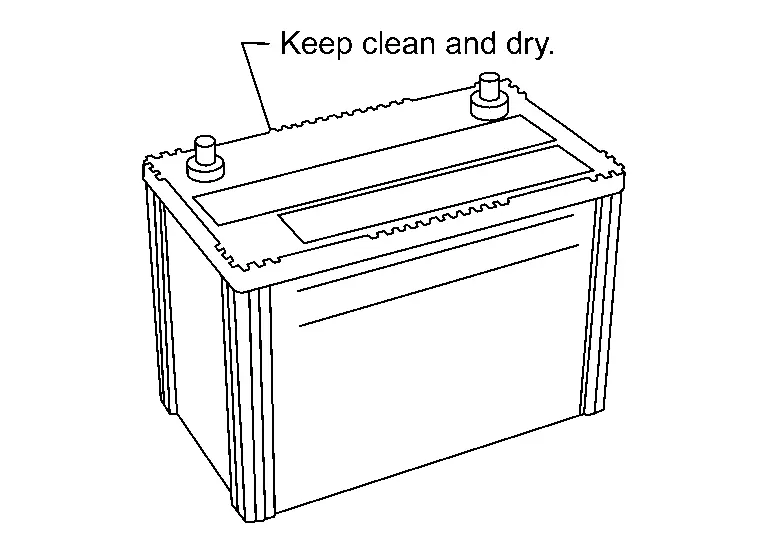
-
The terminal connections should be clean and tight.
-
When the Nissan Pathfinder vehicle is not going to be used over a long period of time, disconnect the battery cable from the negative terminal. (If the Nissan Pathfinder vehicle has an extended storage fuse switch, turn it off.)
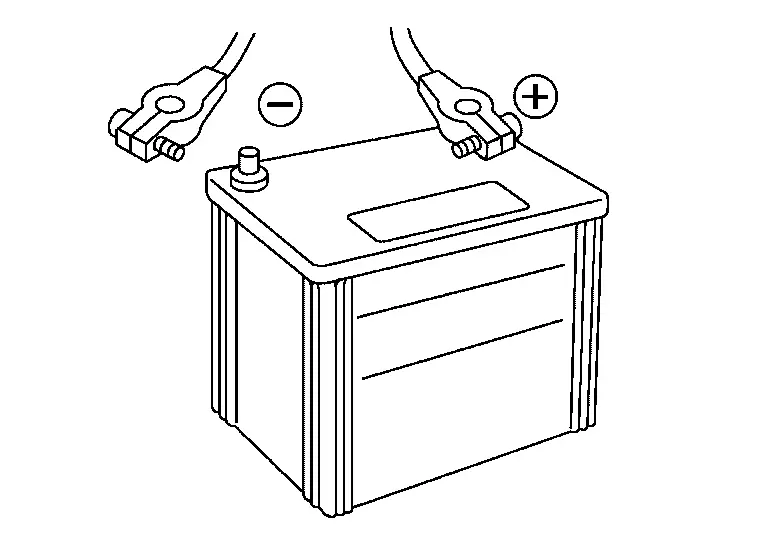
Work Flow
BATTERY DIAGNOSIS WITH 165-DSS-5000P
To diagnose and confirm the condition of the battery, use the 165-DSS-5000P.
 NOTE:
NOTE:
Refer to the Instruction Manual for proper battery diagnosis procedures.
BATTERY DIAGNOSIS WITHOUT 165-DSS-5000P
OVERALL SEQUENCE
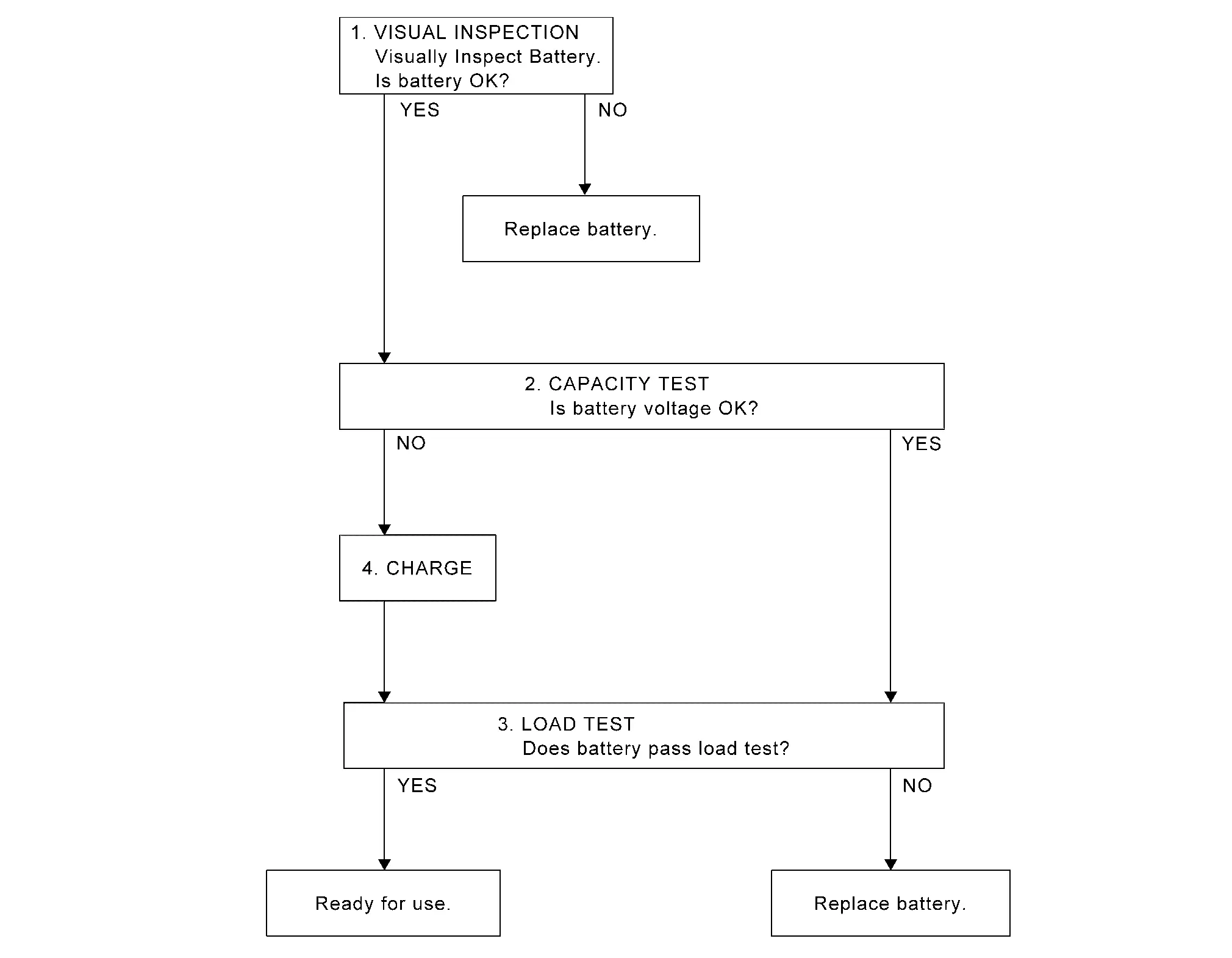
DETAILED FLOW
VISUAL INSPECTION
-
Check battery case for cracks or bends.
-
Check battery terminals for damage.
Are these inspection results normal?
YES>>GO TO 2.
NO>>Replace battery. Refer to Removal and Installation.
CAPACITY TEST
Check battery voltage.
Is the voltage 12.35 V or more?
YES>>GO TO 3.
NO>>GO TO 4.
LOAD TEST
-
Check battery type and determine the specified current using the table.
Type Current (A) L3 EFB 720 L4 EFB 760 -
Read load tester voltage when specified discharging current flows through battery for 15 seconds.
 NOTE:
NOTE:
Follow tool manufacturers operating instructions when performing load test.
Is the voltage 10 V or more?
YES>>Ready for use.
NO>>Replace battery. Refer to Removal and Installation.
CHARGE
Charge battery following the instructions below:
-
Constant current charging may damage batteries. Therefore, charge battery by constant voltage charge mode with the maximum voltage set at 15 V.
-
Charge at least 6 hours or until the charge current becomes 4 amps or less.
YES>>
GO TO 3.
Inspection and Adjustment. Additional Service When Removing Battery Negative Terminal Nissan Pathfinder R53
Special Repair Requirement
| System | Item | Reference |
|---|---|---|
| Engine Control System | Idle Air Volume Learning | Work Procedure |
| Door & Lock | Calibration Of Automatic Back Door Position Information | Work Procedure |
| Power Window Control System | Power Window System Initialization | Work Procedure |
| Roof |
Moonroof Memory Reset/Initialization Sunshade Memory Reset/Initialization |
Special Repair Requirement |
| Automatic Drive Positioner | Automatic Drive Positioner System Initialization | Refer to Owner's Manual. |
| Heater & Air Conditioning Control System | Temperature Setting Trimmer (front) | Temperature Setting Trimmer (Front) |
| Temperature Setting Trimmer (rear) | Temperature Setting Trimmer (Rear) | |
| Foot Position Setting Trimmer | Foot Position Setting Trimmer | |
| Inlet Port Memory Function (FRE) | Inlet Port Memory Function (FRE) | |
| Inlet Port Memory Function (REC) | Inlet Port Memory Function (REC) | |
| Setting of Target Evaporator Temperature Upper Limit Value | Setting of Target Evaporator Temperature Upper Limiit Value | |
|
Audio, Visual & Navigation System |
Audio (Radio Preset) | Refer to Owner's Manual. |
| Navigation System | Refer to Owner's Manual. |
Fuse Inspection Nissan Pathfinder 2022
How To Check
-
If fuse is blown, be sure to eliminate the cause of the malfunction before installing a new fuse.
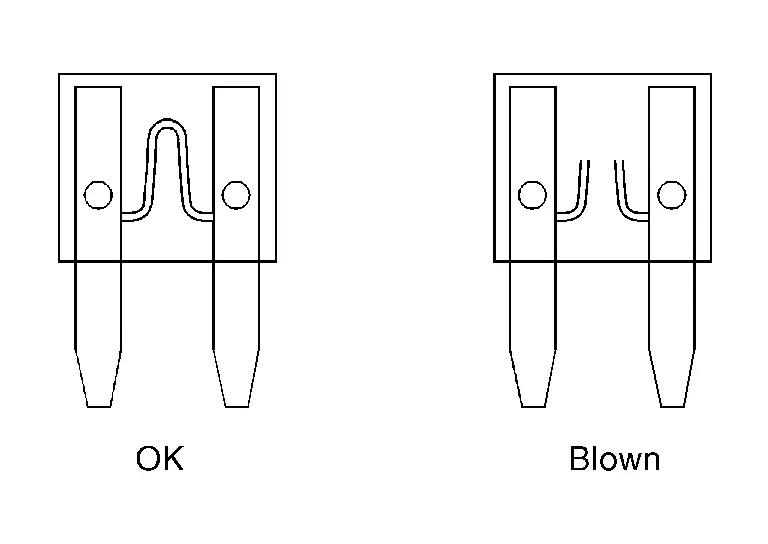
-
Use fuse to the specified rating. Never use a fuse of more than the specified rating.
-
Do not partially install the fuse; always insert it into the fuse holder properly.
-
Remove fuse for “ELECTRICAL PARTS (BAT)” if Nissan Pathfinder vehicle is not used for a long period of time.
EXTENDED STORAGE SWITCH (IF EQUIPPED)
 NOTE:
NOTE:
-
When extended storage switch is pulled out, a message may be shown in the meter or display. To turn message/display off, push extended storage switch in.
-
The following information is related to extended storage switch (shipping mode). For information related to BCM transit mode, refer to System Description.
The following switch may be mounted on the fuse block (Junction Box) for transportation and storage.
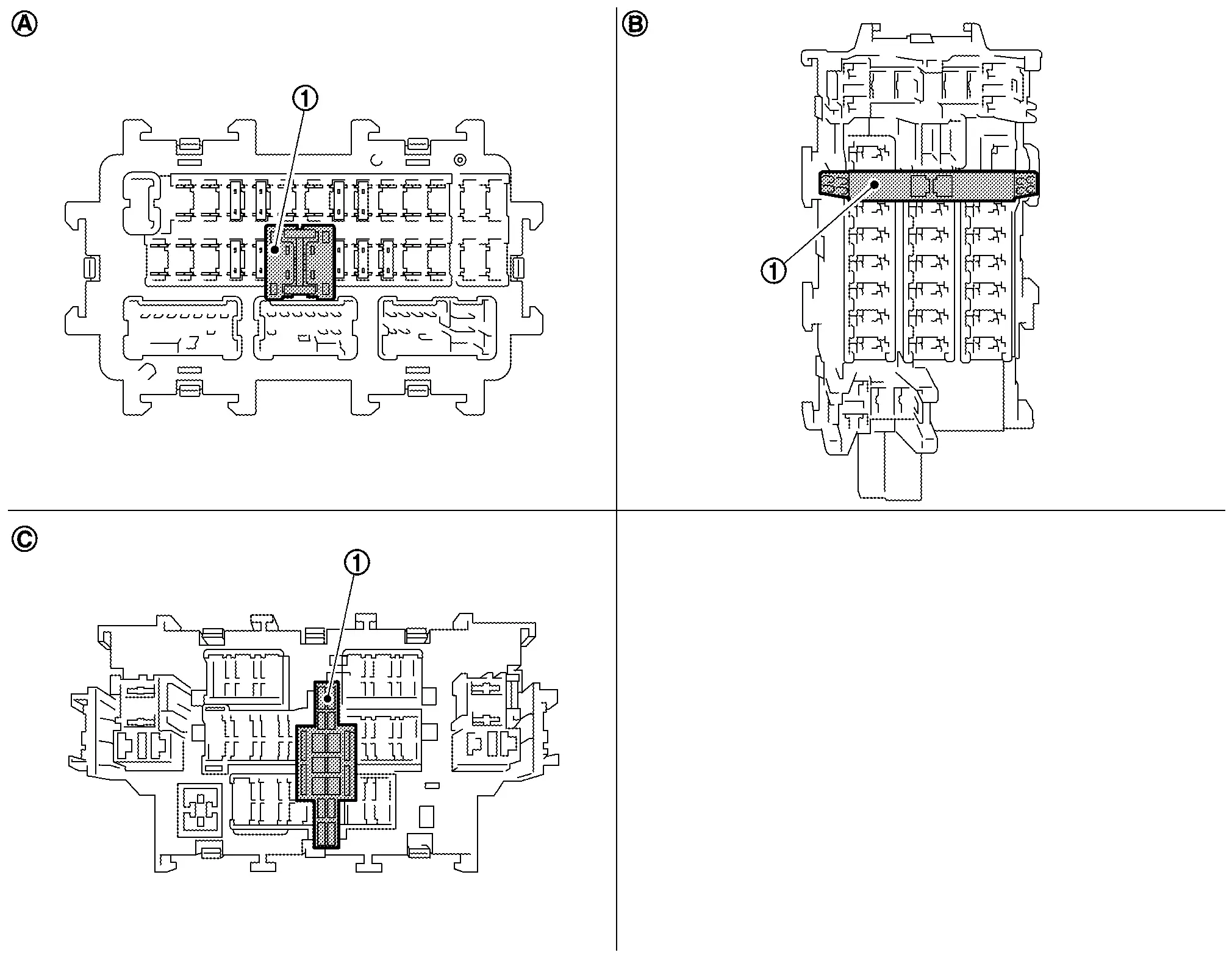
 |
Extended storage switch | ||||
 |
Type A |
 |
Type B |
 |
Type C |
Remove the extended storage switch if it interferes when checking fuses.
How/When to turn Extended Storage Switch ON/OFF
CAUTION:
-
Ignition switch OFF when operating the extended storage switch.
-
Under normal conditions, keep the extended storage switch in ON state. Never operate the extended storage switch except when necessary.
-
Type A
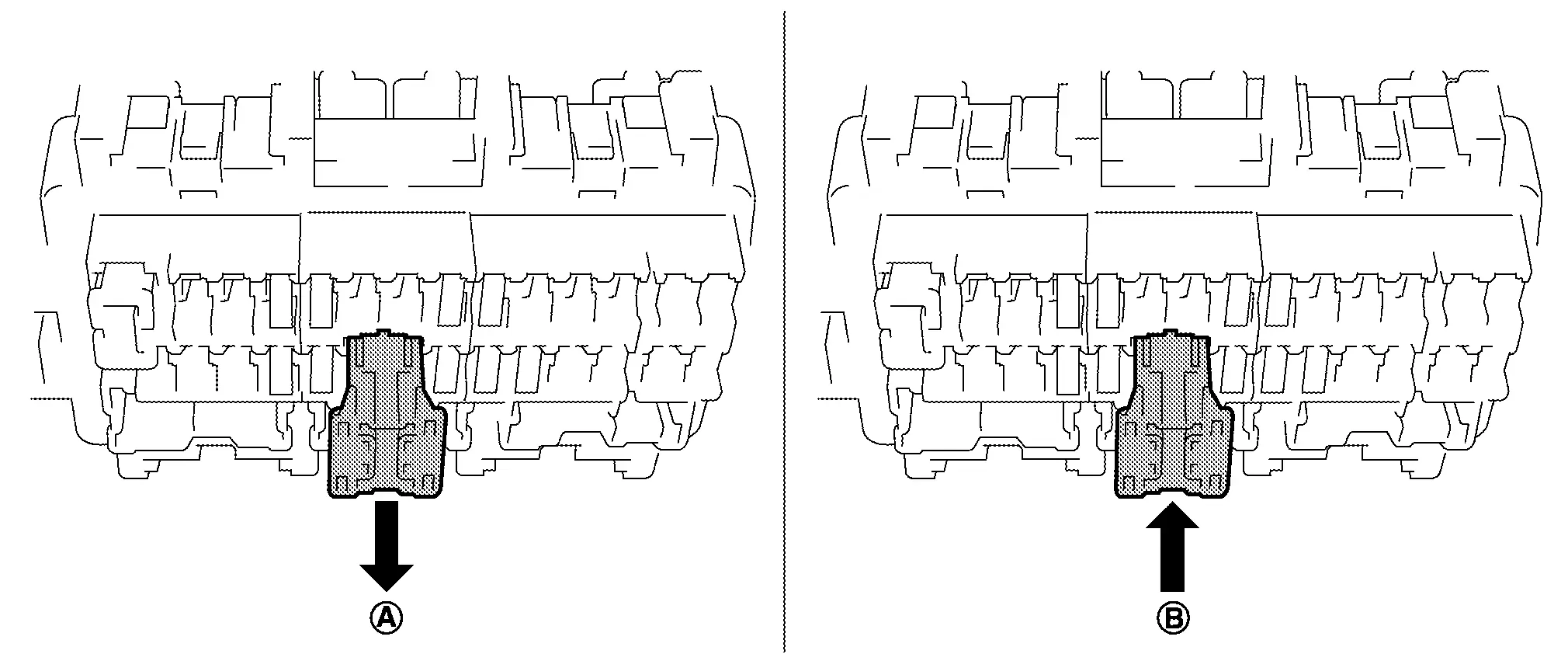
-
To turn the extended storage switch OFF, pull out in
 direction as shown in the figure.
direction as shown in the figure. -
To turn the extended storage switch ON, press in
 direction as shown in the figure.
direction as shown in the figure.
-
-
Type B
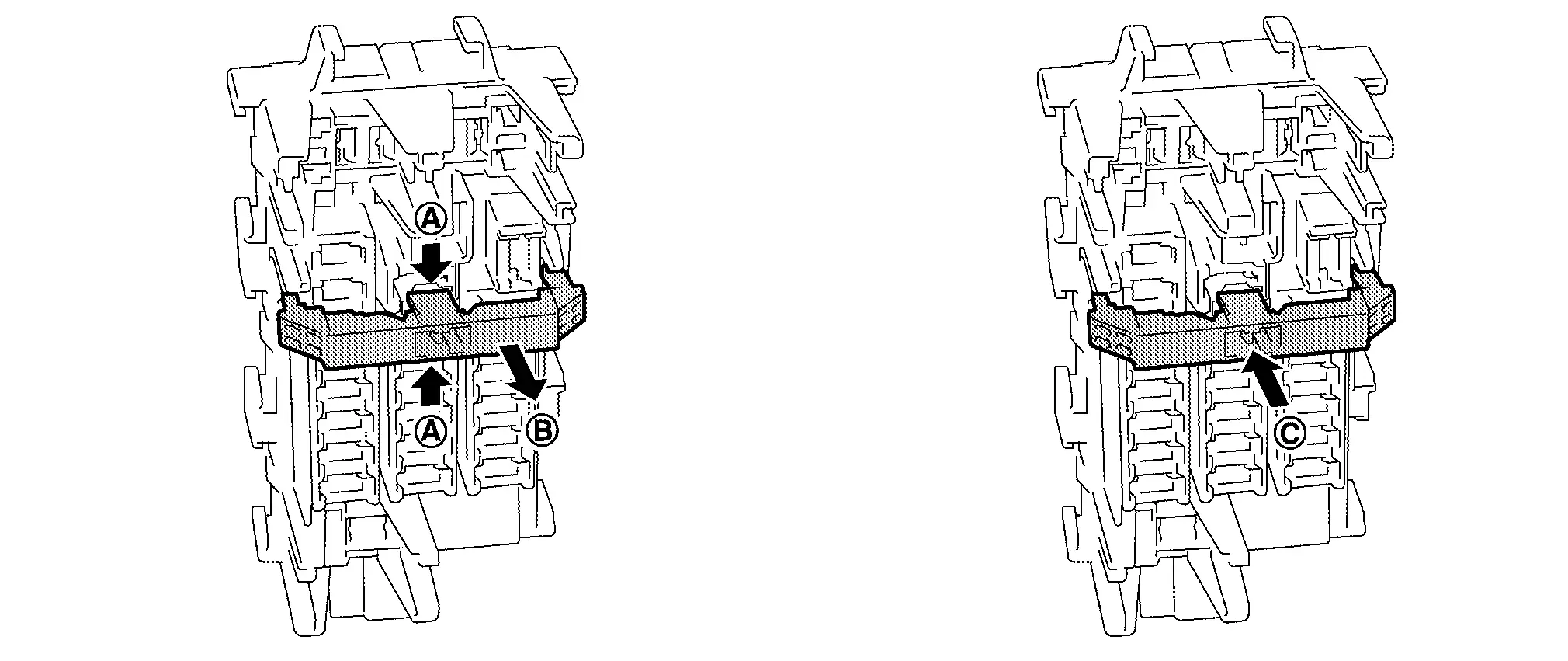
-
To turn the extended storage switch OFF, pinch tabs
 of the switch and pull out in
of the switch and pull out in
 direction as shown in the figure.
direction as shown in the figure. -
To turn the extended storage switch ON, press in
 direction as shown in the figure.
direction as shown in the figure.
-
-
Type C
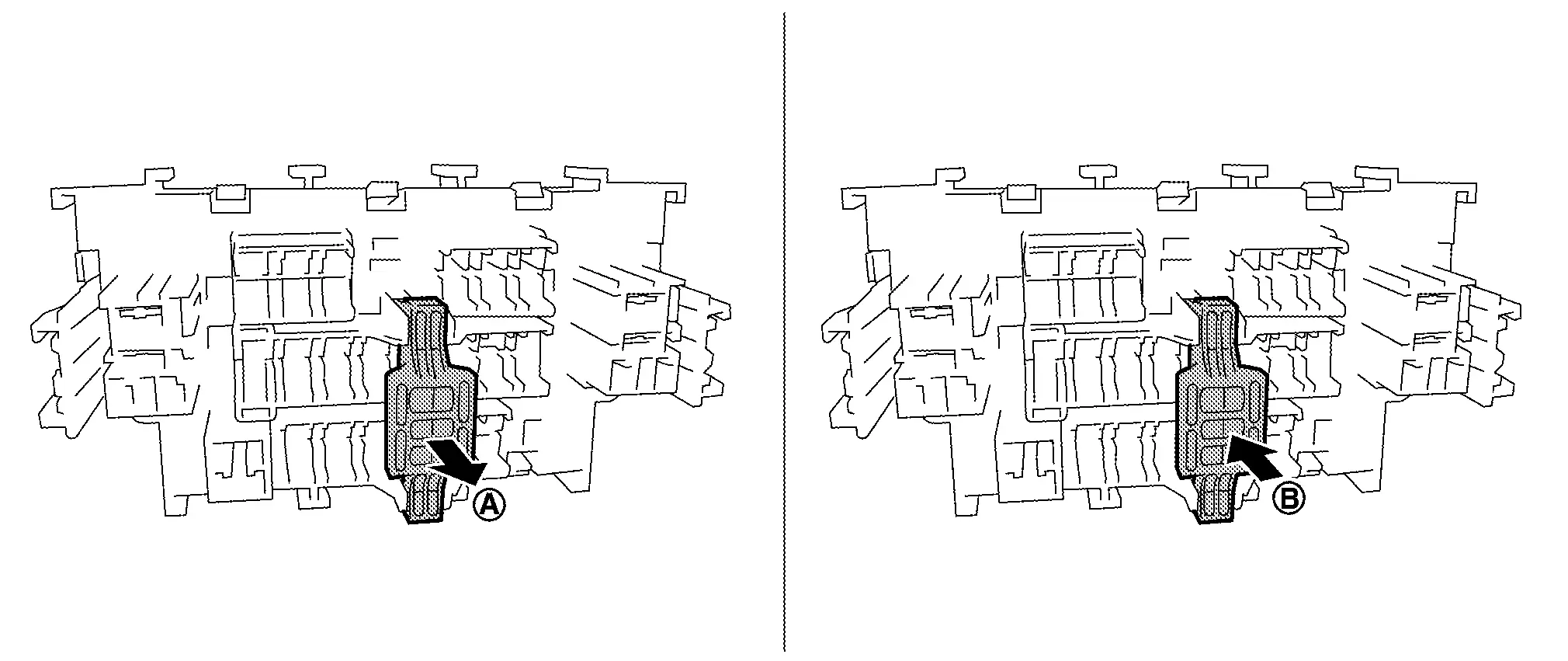
-
To turn the extended storage switch OFF, pull out in
 direction as shown in the figure.
direction as shown in the figure. -
To turn the extended storage switch ON, press in
 direction as shown in the figure.
direction as shown in the figure.
-
How To Remove Extended Storage Switch
Type A
-
Ignition switch OFF.
-
Turn the extended storage switch OFF.
-
Pinch tabs
 and tilt to disengage the extended storage switch. Pinch tabs
and tilt to disengage the extended storage switch. Pinch tabs
 to remove the extended storage switch.
to remove the extended storage switch.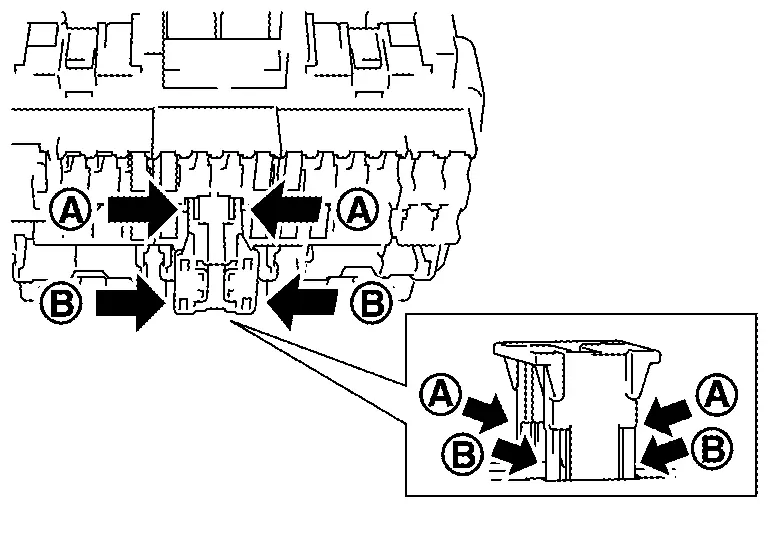
CAUTION:
For bus bar type extended storage switch, never replace bus bar with a fuse, or fuse may continually open.
 NOTE:
NOTE:
-
Extended storage switch and fuse (or bus bar) are removed together. Remove fuse (or bus bar) from extended storage switch, if necessary.
-
Install removed fuse (or bus bar) to fuse block.
-
Extended storage switch is for transportation and storage. Reinstallation of switch is not required after removal, but fuse (or bus bar) must be reinstalled/pushed back in to activate all electrical systems and turn message off (which may be shown in meter/display).
-
Type B
-
Ignition switch OFF.
-
Turn the extended storage switch OFF.
-
Pinch tabs
 and firmly pull out the extended storage switch in
and firmly pull out the extended storage switch in
 direction.
direction.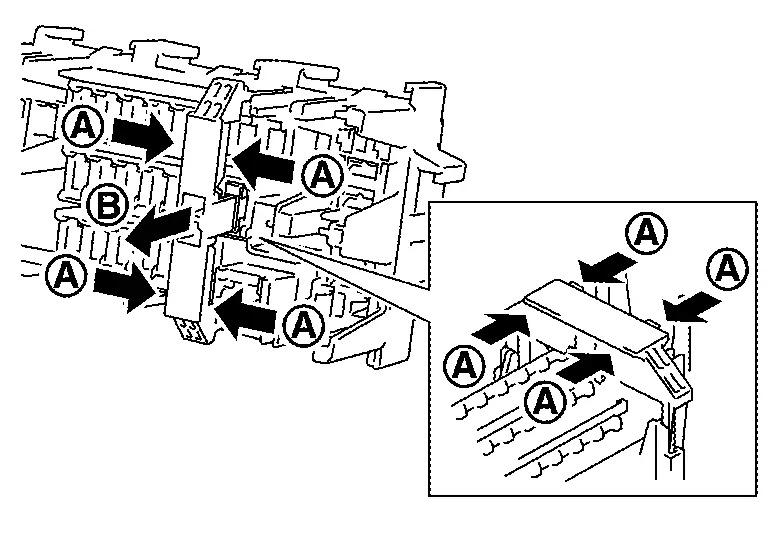
CAUTION:
For bus bar type extended storage switch, never replace bus bar with a fuse, or fuse may continually open.
 NOTE:
NOTE:
-
Extended storage switch and fuse (or bus bar) may be removed together. Remove fuse (or bus bar) from extended storage switch, if necessary.
-
Install removed fuse (or bus bar) to fuse block.
-
Extended storage switch is for transportation and storage. Reinstallation of switch is not required after removal, but fuse (or bus bar) must be reinstalled/pushed back in to activate all electrical systems and turn message off (which may be shown in meter/display).
-
Type C
-
Ignition switch OFF.
-
Turn the extended storage switch OFF.
-
Pinch tabs
 and firmly pull out the extended storage switch in
and firmly pull out the extended storage switch in
 direction.
direction.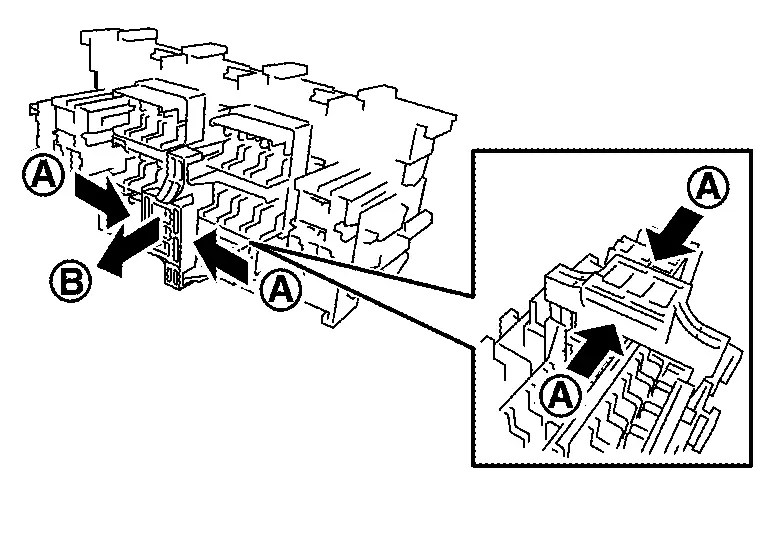
CAUTION:
For bus bar type extended storage switch, never replace bus bar with a fuse, or fuse may continually open.
 NOTE:
NOTE:
-
Extended storage switch and fuse (or bus bar) are removed together. Remove fuse (or bus bar) from extended storage switch, if necessary.
-
Install removed fuse (or bus bar) to fuse block.
-
Extended storage switch is for transportation and storage. Reinstallation of switch is not required after removal, but fuse (or bus bar) must be reinstalled/pushed back in to activate all electrical systems and turn message off (which may be shown in meter/display).
-
Fusible Link Inspection Nissan Pathfinder 2026
Fusible Link
A melted fusible link can be detected either by visual inspection or by feeling with a finger tip. If its condition is questionable, use circuit tester or test lamp.
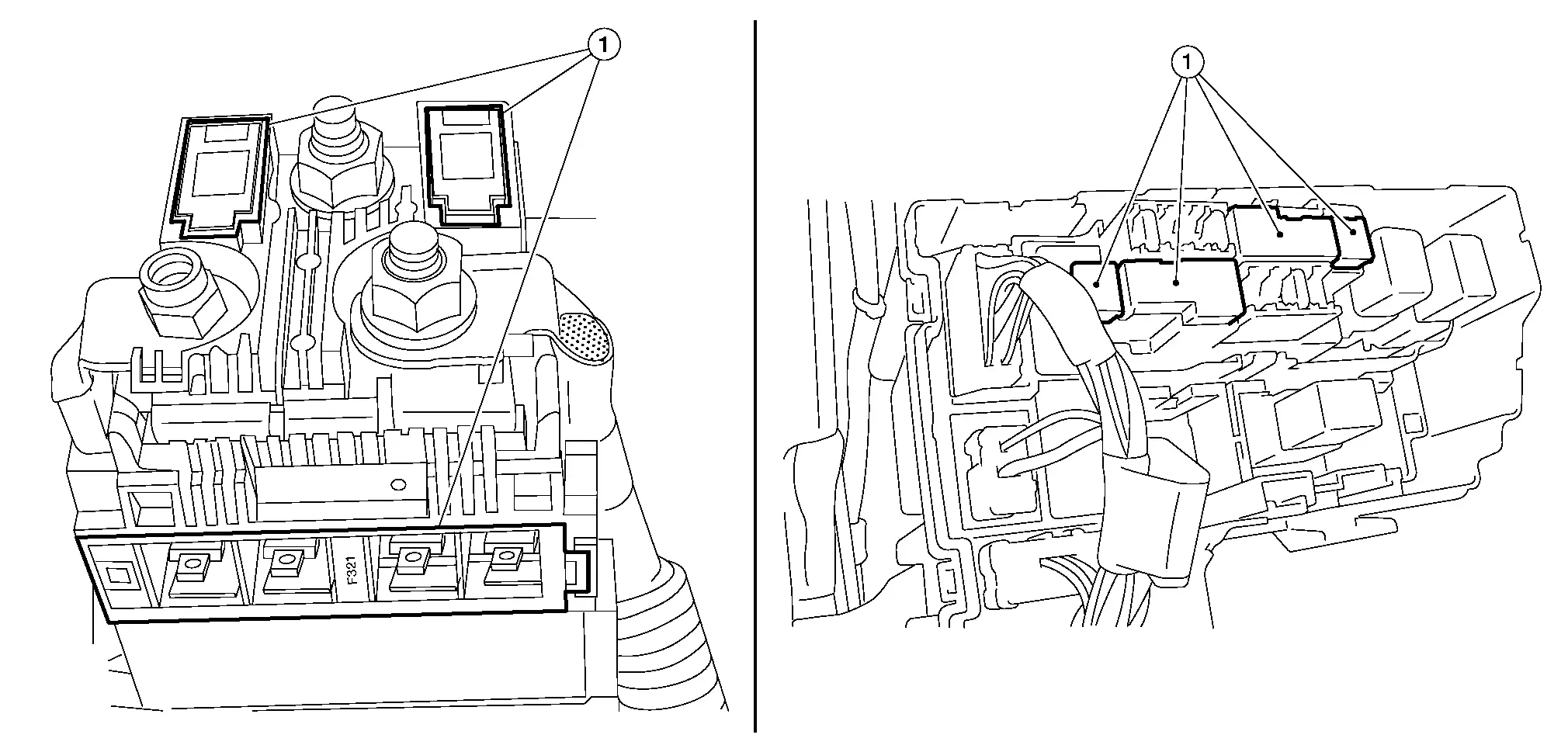
| 1 | : Fusible link |
CAUTION:
-
If fusible link should melt, it is possible that critical circuit (power supply or large current carrying circuit) is shorted. In such a case, carefully check and eliminate cause of malfunction.
-
Never wrap outside of fusible link with vinyl tape. Important: Never let fusible link touch any other wiring harness, vinyl or rubber parts.

Nissan Pathfinder (R53) 2022-2026 Service Manual
Basic Inspection
- Battery
- Inspection and Adjustment. Additional Service When Removing Battery Negative Terminal
- Fuse Inspection
- Fusible Link Inspection
Contact Us
Nissan Pathfinder Info Center
Email: info@nipathfinder.com
Phone: +1 (800) 123-4567
Address: 123 Pathfinder Blvd, Nashville, TN 37214, USA
Working Hours: Mon–Fri, 9:00 AM – 5:00 PM (EST)
